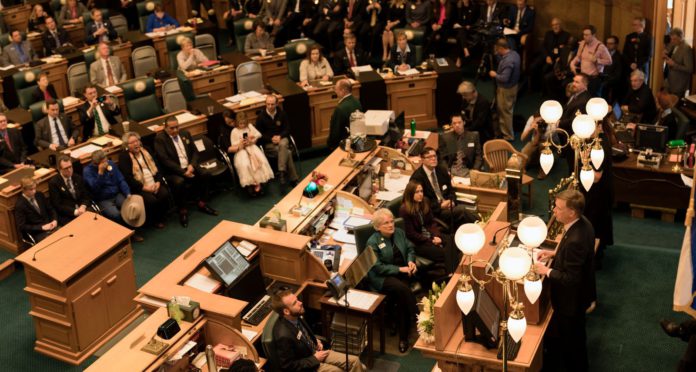

Gov. John Hickenlooper delivered his final State of the State address at the Colorado State Capitol Building on Thursday. He began by recognizing lawmakers and his cabinet for their hard work.
“At a time when shouting seems to have replaced talking, and insults sometimes seem to replace ideas, I want to start by honoring the men and women who join me in this chamber,” he said.
Hickenlooper highlighted a handful of successes for the Centennial State that lawmakers achieved over the last year, calling it the “most impactful bipartisan session since the Great Recession. We reminded everyone that the collaborative Colorado way is the best way.”
Hickenlooper touted Colorado’s role as the first state to legalize a recreational marijuana program, a comment that was met with a few sparse claps.
“There’s one clapper in the back,” he joked. But he noted that Colorado’s experience provided a roadmap for other states, how tax revenue has helped fund homeless initiatives, and bounced back to a full applause after he added “I don’t think any of us are wild about Washington telling us what’s good for us. We expect that the federal government will respect the will of Colorado voters.”
Colorado’s healthy economy and job market were also a point of pride during the address.
“If you haven’t lived in Colorado long, you might think that the state you see today is inevitable,” he said. “But when we first met in this room, our economy was in disarray.”
The state’s unemployment rate has taken a nosedive, falling from 8.8 percent in 2010 to 2.7 percent in October of last year. Hickenlooper said that Colorado’s numbers on job growth also speak for themselves and that the state serves as a model for business and entrepreneurship. But he added that the same cannot be said for communities outside the Front Range.
“Today more Coloradans are working than ever before. The Colorado secret is out: our in-migration to the Front Range is the envy of the nation, but our rural areas are not experiencing the same boom. We need to create the right ecosystem,” he said.
He called for more good jobs and school funding in rural parts of the state and encouraged incentives for businesses. Startup Colorado is a five year, $10 million-dollar initiative to do just that. The project will focus on providing access to capital to small businesses and entrepreneurs in rural areas. The issue of broadband expansion into rural Colorado counties was also touched on again this year. Hickenlooper said rural broadband coverage went from 60 to 80 percent in the last year, and is projected to reach 100 percent by 2020.
One of the biggest triumphs was the legislative compromise and adjustments to the state’s hospital provider fee. The TABOR cap impacted refunds and how much money (including federal matching dollars) would be provided for other things like roads and education in the budget.
“We now have a little more balance and a little more sanity in our budget, and hospitals in rural Colorado that would’ve closed continue to serve thousands of patients,” Hickenlooper said.
He added that in 14 counties, individuals only have one plan option through the state exchange. Hickenlooper said that though the Affordable Care Act isn’t perfect, it has helped reduce Colorado’s uninsured rate by half. He said that the year before the ACA was enacted, more than 100,000 bankruptcy cases in the state were caused by medical debt, adding that access to affordable healthcare is an economic argument “as much as it is a health or moral one.” The year after the ACA went into effect, he said that number decreased by 60 percent.
Hickenlooper also called attention to sexual harassment claims that have plagued state government and entertainment realms in recent months.
“Let’s pledge here and now that we will not tolerate sexual harassment in the state of Colorado,” he said.
On education, Hickenlooper called for more opportunities for skills-based training and apprenticeships rather than strict degree paths, commending Colorado’s CareerWise program. A funding package of $10 million will also go toward closing teacher shortages in rural areas. And for higher education, Hickenlooper noted that Purdue University has not raised tuition in six years. He called for a focus on costs, and admitted that it would take flexibility, but that it remained an important goal.
“Progress isn’t always painless,” he added. “My mother used to say ‘Use it up, wear it out, make do or do without.’ Turns out those are pretty good words for a state to live by.”
Hickenlooper urged for a solution to PERA funding, a legislative fix to cap orphan wells and a focus on ending the opioid crisis in the state. The fight over transportation and K-12 funding also loomed large over the last legislative session and will prove to be a hurdle for 2018.
“Politics need not always be a blood sport, we need not wage war between the blue team and the red team. Dedicated people, even those who disagree at times, can still achieve goals together.”
— Kaley LaQuea

